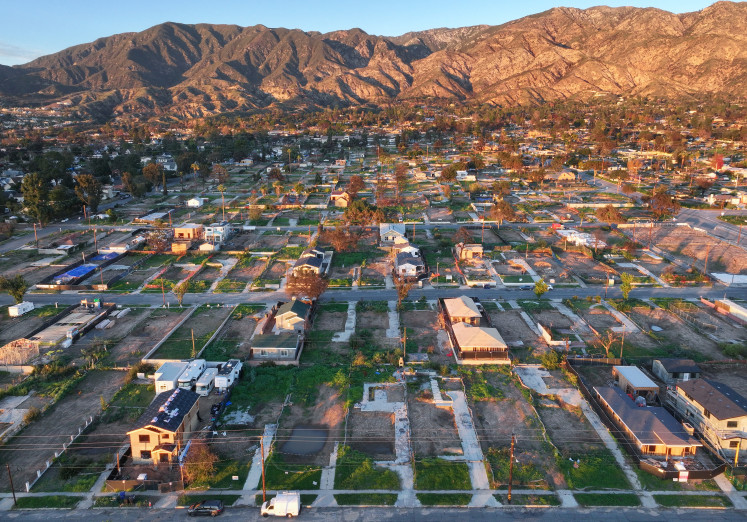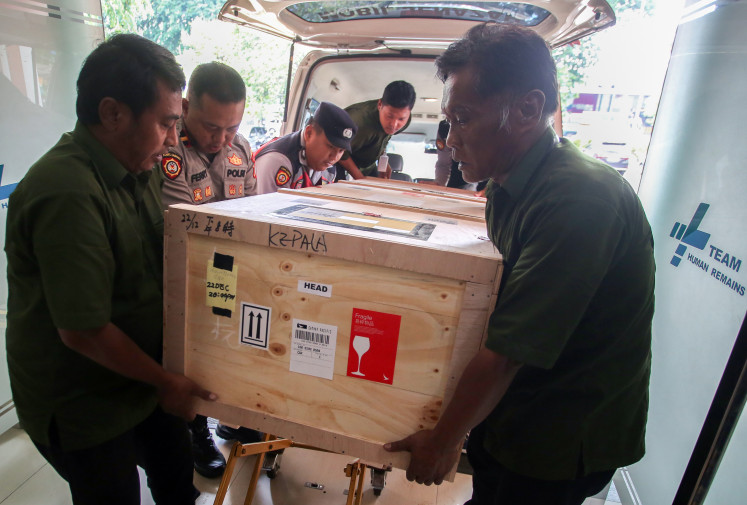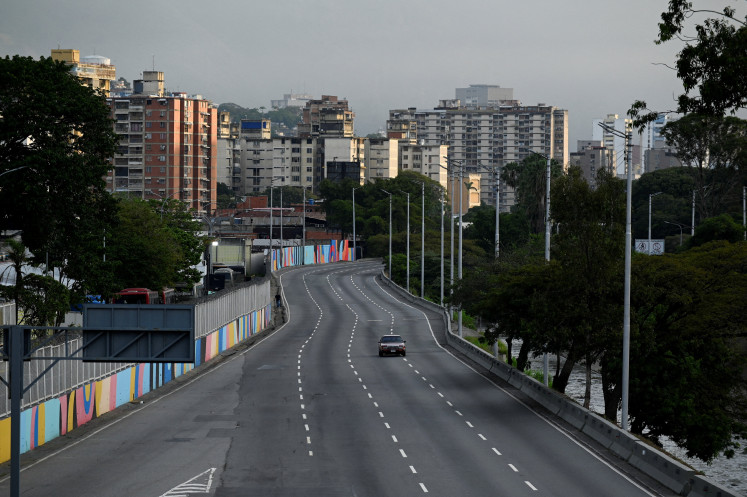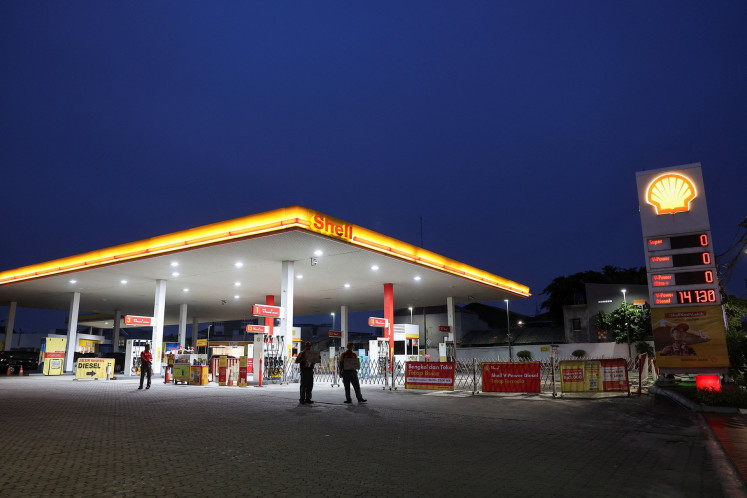Popular Reads
Top Results
Can't find what you're looking for?
View all search resultsPopular Reads
Top Results
Can't find what you're looking for?
View all search resultsHarris’ trip a ‘strategic signaling’ to Indonesia, ASEAN?
The ASEAN Outlook in Indo-Pacific (AOIP), as agreed at the ASEAN Leaders Summit in Bangkok in June 2019, is a perfect example of how the member states of ASEAN, trying their best to attenuate any sharp jostling between the great powers
Change text size
Gift Premium Articles
to Anyone
hen United States Vice President Kamala Harris made two separate trips to Singapore (Aug. 22) and Vietnam (Aug. 26), two of her most important foreign policy goals were to enlist the support of Singapore to vouch that the US would always be welcomed in the Indo-Pacific as a "security guarantor", and that countries surrounding China should not be intimidated into believing that "rule of law" in the region would be compromised in any bilateral or multilateral issues.
On her subsequent trip to Hanoi, she encouraged Vietnam to be a "strategic partner” of the US, with further assurance that the US would send 1 million doses of vaccines until the Delta variant or its breakthrough variant was successfully contained.
These two gestures do not undermine the concept of ASEAN centrality. What is odd is that the US vice president did not make the extra mile to visit Jakarta, the geopolitical center of Southeast Asia. Could it be true, as Evan Laksmana argued, in Foreign Policy, that "Indonesia is not ready for any great power clashes in the Indo-Pacific region.”
The answer to this statement would have to be in the affirmative. When President Joko “Jokowi” Widodo was asked by a CNN interviewer way back in August 2019, "between domestic policy and foreign policy, which would you prioritize?" without batting an eyelid, President Jokowi answered: "Domestic policy." But that was nearly two years ago.
With Indonesia experiencing a shortage of mRNA vaccines, which appear to be more effective in halting the progress of COVID-19, Jakarta has had no choice but to tilt to the West, just as it does not want China to disrupt the military balance of power at sea or underwater, or be engaged in any space race with its adversaries that makes ASEAN unstable; since its location in the Indo-China hinterland, or the maritime portion of Southeast Asia, is at the crossroads of international trade, with or without the pandemic.
But there is another reason why Indonesia, despite its Pan Indo-Pacific advantages, where Jakarta is averse to any type of behavior that seems to be blunt, is verging on being anti-China.
Since 2007, Indonesia has internalized the conjoined concept of "ASEAN Centrality." It makes Jakarta and all member states equally important.
To be sure, this word merely appeared in two sections of the ASEAN Charter. It is not a unitary diplomatic concept at all. But an aspirational one.
The rhetorical emphasis is on the importance of ASEAN, which is a mere sub-region of the Indo-Pacific, to become more connected per the Hanoi Action Plan, otherwise known as the ASEAN Master Plan.
The latter was revised in 2015 to further enhance people-to-people exchange, broadband interconnectivity, institutional convergence and convenience. The end goal is an ASEAN Community by 2025.
But without a large infusion of at least US$1.5 trillion into the region, to begin with, an ASEAN Community is an impossible feat, especially when it is now the epicenter of the Delta variant and various breakthrough variants.
Therefore, the polite, if not, fictional pretense allows ASEAN to latch on to its "centrality," to serve as the "sherpa" of the major powers to the peak of the summitry. But, in reality, "ASEAN Centrality," is the sheer passing of the buck by the member states, as well as sectoral, dialogue and strategic partners to the ASEAN Secretariat to get the conferences in tip top condition. Nothing more, nothing less. In a way, a picturesque diplomatic photo-op for all participating heads of government and states.
The ASEAN Outlook on the Indo-Pacific (AOIP), as agreed at the ASEAN Leaders Summit in Bangkok in June 2019, is a perfect example of the member states of ASEAN trying their best to attenuate any sharp jostling between the great powers. This is because the member states of ASEAN believe in defensive diplomacy, while the great powers subscribe to the notion that "if you want peace prepare for war."
The AOIP, intellectually valid or otherwise, seeks to prevent them from being caught in any armed conflict in the Indian Ocean, the South China Sea and the Pacific East of the first island chain of Japan, South Korea, the Philippines and Indonesia.
Jakarta, together with the member states of ASEAN, also intentionally invoked ASEAN centrality to shoulder the weight of holding various summits or events in the region.
Among them are the East Asia Summit (EAS) held back-to-back with ASEAN-related summits, at the end of the year.
President Joe Biden has obliged himself to attend the EAS in November 2021, even though he is likely to sit at the round table with Mihn Aung Hlaing, the leader of the coup in Myanmar on Feb. 1.
According to Prof. Stephen Krasner, a political scientist at Stanford University and former deputy director of policy planning at the US State Department, considering the whole basis of international relations, when a country is in a serious crisis, then there is no one to call for help.
That’s also a key point of the late Prof. Kenneth Waltz. This basis is, therefore, defined as "systemic anarchy" – where each country must rely on its strategic guile and depth – to get itself out of any troubles.
As an emerging power struggling with the ramifications of COVID-19, Jakarta must be careful to avoid a terminal decline. Otherwise, it would be caught squarely in any cockpit of major power rivalry in Southeast Asia.
This does not mean Indonesian statecraft is full of deception and false facades. But it does mean Indonesia has to focus on the key problem at hand: how to break the chain of Delta variant transmission. Otherwise, its US$1 trillion gross domestic product will suffer serious structural contraction; leading to large inequitable income.
Indeed, when all the member states of ASEAN are presumptuously using ASEAN centrality in a unified manner, to feign their seeming importance, they can only create the chimera of unity. Cambodia and Laos are not necessarily in the US’ corner. The COVID-19 common fund of ASEAN stands at $19.1 billion. This is a mere band aid. Hence, the recent trip of Harris, as US foreign policy toward ASEAN, has perhaps said it all too well.
If Indonesia does not buck up, indeed, as the leading member state of ASEAN, she could only make it as far as Singapore and Vietnam. However, if Indonesia does want to be the key geopolitical pivot of the Indo-Pacific region to earn the attention and affection of the Group of 7, what Indonesia will ultimately get from the US-led G7 will far exceed all that is given to Vietnam.
***
The writer is the founder and CEO of Strategic Pan Indo-Pacific Arena










